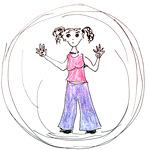
August 7, 2006
the researcher in their work: natural passions
Posted by dogpossum on August 7, 2006 10:10 AM in the category academia
I really need to get on and do some work, but I did want to write a tiny bit about how our own interests and passions motivate our research. So, for example, I'm a keen lindy hopper, and this lead (eventually) to my writing about lindy hoppers.
This point was brought to my attention in class last week when a student blushed and declared embarassment for his passion for an 'uncool' film star. I took this as a neat opportunity to talk about people like Matt Hills and Jenkins and other fan studies doods, pointing out the idea that much of audience studies research - fan studies in particular - begins with the author's own interets. In the simplest terms, our attention is caught because we give a shit about the topic. And is kept because we're passionate about the things and people we are writing about. So being dismissive of someone's interests simply because they're 'low brow' isn't terribly productive.
But I do think it's a strength to write from what you know, or rather, from what you care about. Whether you're writing about a favourite telly program or about women and capitalism. I feel that bias is a strength, if only because it serves as sufficient motivation to get us through a massive research project like a PhD or a book.
I don't have time to go on into detail about this, but there's a chunk of lit talking about the ethical and methodological issues which attend writing from 'inside' the community you're studying.
Some of the most interesting is from dance studies. Check out this nice quote:
I am an anthropologist, but I am also a dancer and I begin my investigation of gender in ballet by using my dance experiences as a case study… I adopt this approach because it allows me to shift between my memories and comments as a dancer and my analysis as an anthropologist, in a sense using autobiography as fieldwork data.(Novack, Cynthia J. "Ballet, Gender and Cultural Power." Dance, Gender and Culture. Ed. Helen Thomas. London: Macmillan, 1993. 34-48).The researcher…is an essential component of all research. …It is important to take account of the fact that I (the researchers/interviewer) was an active agent in the research setting, attempting to make sense of and contributing to the dancers’ discussions about an activity that is not bound by verbal language. I would contend that my intervention in the … process was enabling rather than, as an objectivist approach would argue, a hindrance to the research. … the idea inherent in an objectivist framework that the researcher is an invisible being who drops into and reveals the practices and ways of others (the researched) becomes redundant, in favour of a reflexivity of accounts. …this does not mean that the project should be full of ‘soul searching’ or ‘navel gazing’. It entails, rather, that the researcher reveal or uncover his/her grounds for speaking; that he/she should be reflexive on the context, methods and procedures adopted and at the same time, enable the voices of the researched to speak (35 - 76).
I've written in greater detail about this in my thesis, combining fan studies stuff and dance studies stuff, with an emphasis on feminist and African American writers in the latter. In fact, a significant portion of my argument throughout my work is devoted to the notion of participation in discourse, where dance is discourse, and participation is not only important, but non-verbal.
...ok, I have to run. I'll see if I can write more later...




